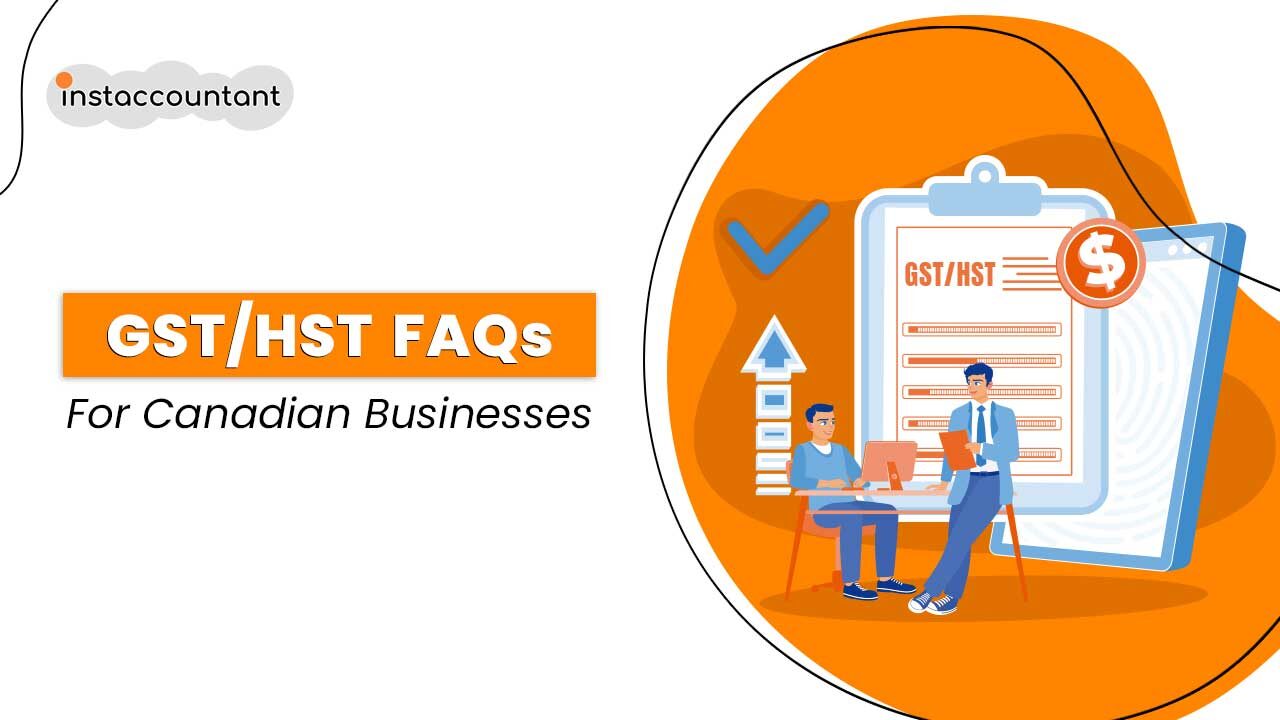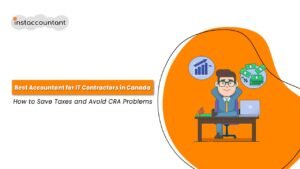Did you know that incorrect GST/HST filing can result in costly penalties and fines for Canadian small businesses? Understanding GST/HST is important, whether you’re self-employed, an independent contractor, or or running a corporation. Alongside income tax, it’s essential to figure out if you need to register for GST/HST and when to collect sales tax in Canada.
Dealing with GST/HST registration, filing, and exemptions can be confusing. Many questions come up about these topics, and in this blog, we’ll answer your most common GST/HST questions, giving you the knowledge and confidence to manage your Canadian sales tax obligations and avoid costly mistakes.
1. General Information about GST and HST
What is the difference between GST and HST?
GST (Goods and Services Tax) is a 5% federal tax imposed on most goods and services sold in Canada. HST (Harmonized Sales Tax) combines the GST with the provincial sales tax in certain provinces, with rates varying from 13% to 15% depending on the province. Understanding the difference is crucial for businesses operating in different provinces, as it affects pricing, invoicing, and compliance.
What are the GST/HST rates in Canada?
- GST rate: 5% (applicable across Canada).
- HST rates by province:
- Ontario: 13%
- New Brunswick: 15%
- Newfoundland and Labrador: 15%
- Nova Scotia: 15%
- Prince Edward Island: 15%
Staying informed about regional rates is essential for accurate tax calculations and compliance.
2. Registration and Filing
Who needs to register for GST/HST?
Businesses with taxable revenues exceeding $30,000 in a single calendar quarter or in four consecutive quarters must register for GST/HST. This requirement includes small businesses, freelancers, and independent contractors. Notably, taxi and ride-sharing businesses must register regardless of their sales, which is a unique regulation that affects many independent drivers.
How do I register for GST/HST?
You can register for GST/HST online through the Canada Revenue Agency (CRA) website, by mail, or by calling the CRA directly. When registering, you’ll need to provide details about your business structure, contact information, and estimated taxable revenues. Early registration can help avoid penalties and ensure compliance.
What are the benefits of registering for GST/HST?
Benefits of registration include:
- The ability to collect GST/HST from customers.
- Recover Input Tax Credits (ITCs) on business expenses.
- Improved cash flow by offsetting taxes paid on purchases.
Being GST/HST registered can enhance your business’s credibility and facilitate better financial management.
3. Input Tax Credits (ITCs)
What is an Input Tax Credit (ITC)?
An Input Tax Credit (ITC) allows businesses to recover the GST/HST paid on eligible business expenses. When you file your GST/HST return, you can claim ITCs for expenses directly related to your business operations. Understanding ITC eligibility is crucial for maximizing your tax savings.
What documentation do I need for ITC claims?
You need invoices or receipts showing the GST/HST paid on purchases, along with proof of payment. Ensure that your records clearly indicate the supplier’s GST/HST registration number to support your claims during an audit.
Can I claim input tax credits (ITCs) for GST/HST paid on business expenses?
Yes, as a registered GST/HST business, you can claim ITCs for GST/HST paid on business expenses, which can help reduce your net tax payable. Keeping accurate records of eligible expenses is essential for a smooth claiming process.
4. Filing and Deadlines
When do I need to file my GST/HST return?
Your filing frequency (annual, quarterly, or monthly) depends on your revenue level. Returns are generally due one month after the end of your reporting period. It’s crucial to keep track of deadlines to avoid penalties.
How often do I need to file GST/HST returns?
Filing frequency depends on your annual sales:
- Businesses with sales under $1.5 million file annually.
- Sales between $1.5 million and $6 million require quarterly filings.
- Sales over $6 million require monthly filings.
Expert Insight: Businesses may benefit from aligning their GST/HST filing periods with their financial year-end for streamlined accounting.
What is the deadline for GST/HST returns?
The due date depends on your filing frequency:
- Annual filers: June 15.
- Quarterly filers: End of the month following the quarter.
- Monthly filers: End of the month following the reporting period.
How do I remit GST/HST to the CRA?
You can remit GST/HST online through the CRA’s My Business Account, by mail, or at your financial institution. Timely remittance is vital to avoid interest charges.
What happens if I fail to file my GST/HST return or make a late payment?
Failure to file or make a late payment can result in penalties and interest on the amount owed. The CRA may charge a late-filing penalty, which can be up to 10% of the amount owed, highlighting the importance of compliance.
5. Calculating GST/HST
How do I calculate GST/HST?
To calculate GST, multiply the sale price by 5%. For HST, multiply the sale price by the applicable provincial rate (e.g., 13% in Ontario). Keep meticulous records to ensure accurate reporting.
How do I calculate my GST/HST liability?
Calculate your GST/HST liability by summing up all the GST/HST collected from sales and subtracting any ITCs claimed for eligible expenses. The resulting amount indicates what you owe or can claim for a refund.
What is the Quick Method of accounting for GST/HST?
The Quick Method simplifies GST/HST calculations by allowing eligible businesses to remit a fixed percentage of their sales instead of tracking ITCs.
What is the Simplified Method for claiming ITCs?
The Simplified Method allows small businesses to calculate ITCs based on a percentage of their total purchases.
6. Special Cases and Exemptions
Can I charge GST/HST on all my sales?
Most goods and services are taxable, but some are exempt or zero-rated, such as basic groceries, prescription drugs, and certain health care services. Familiarizing yourself with these classifications is essential to ensure compliance.
What are zero-rated supplies?
Zero-rated supplies are goods and services that are taxable at a rate of 0%. Examples include basic groceries and certain medical devices. Businesses can claim ITCs on expenses related to zero-rated supplies, making it vital to identify these categories correctly.
What are exempt supplies?
Exempt supplies are goods and services that are not subject to GST/HST, such as most health care services and educational services. Businesses cannot claim ITCs on expenses related to exempt supplies, which affects overall tax strategy.
Can I charge GST/HST on exports?
Exports are generally zero-rated, meaning you do not charge GST/HST on exports, but you can still claim ITCs on related expenses. Understanding how to handle international sales is crucial for businesses engaged in export activities.
How do I handle GST/HST for charity events?
Charitable organizations may be exempt from charging GST/HST on certain fundraising activities. However, if they sell goods or services, they must charge GST/HST and remit it to the CRA.
Are there GST/HST exemptions for non-profits?
Non-profit organizations may be exempt from charging GST/HST on certain activities, but they must still register if their taxable revenues exceed the threshold. They can claim ITCs for eligible business expenses, making compliance and tax strategy important for non-profits.
7. Compliance and Penalties
What happens if I don’t file my GST/HST return on time?
Late filing can result in penalties and interest charges. It’s important to file on time to avoid these additional costs, which can accumulate quickly.
What are the penalties for late filing of GST/HST returns?
Late filing penalties typically include a percentage of the taxes owed, increasing with the length of the delay. Interest will also accrue on any unpaid amounts, underscoring the importance of timely compliance.
What should I do if I receive a GST/HST notice from the CRA?
If you receive a notice from the CRA, review it carefully to understand its contents. Respond promptly and accurately, providing any requested information to resolve the issue. Consulting a tax professional can provide clarity on complex notices.
8. Adjustments and Corrections
How do I correct a GST/HST error on my return?
If you discover an error on your GST/HST return, you can correct it by filing an amended return through your My Business Account or by contacting the CRA directly for guidance on how to proceed.
Can I file my return if I haven’t received all my documents?
Yes, you can file your GST/HST return with the information you have. If you are missing documents, make sure to estimate your income and expenses as accurately as possible and file an amended return later if needed.
How do I adjust my GST/HST remittances?
To adjust your remittances, complete an adjustment request through your My Business Account or indicate the changes on your next GST/HST return. Clearly document the reasons for adjustments to maintain accurate records.
What should I do if I disagree with a GST/HST assessment from the CRA?
If you disagree with an assessment, you can file a Notice of Objection with the CRA within 90 days of receiving the notice. Provide a detailed explanation and supporting documentation to support your case.
9. Specific Scenarios and Concerns
How do I handle GST/HST on employee expenses?
You can claim ITCs for GST/HST paid on employee expenses if they are reimbursed and related to your business.
How do I handle GST/HST for gifts and promotional items?
Gifts and promotional items may be subject to GST/HST if their value exceeds $50 per item. You must charge GST/HST on these items when provided as part of your business operations.
How do I handle GST/HST for out-of-province sales?
For sales to customers in other provinces, charge GST/HST based on the customer’s location, applying the appropriate provincial rate. For example, if you sell to a customer in British Columbia, charge 5% GST.
How do I handle GST/HST for online sales?
For online sales, charge GST/HST based on the buyer’s location. If the buyer is in a province with HST, apply that rate. Maintain records of all online transactions for accurate reporting and compliance.
How do I handle GST/HST for mixed-use properties?
For mixed-use properties (part residential, part commercial), you must allocate expenses between taxable and exempt use to determine the appropriate ITC claims. Maintaining clear records supports your calculations.
How do I handle GST/HST on bad debts?
You can claim a bad debt adjustment to recover the GST/HST you previously remitted on a sale that has become uncollectible, helping to manage cash flow effectively.
10. Additional Considerations
How can I apply for a GST/HST number?
You can apply a GST/HST Number in Canada:
- Online via the CRA’s Business Registration Online (BRO) portal.
- By mail using form RC1.
- By phone through the CRA’s Business Enquiries line.
You’ll need your business details, total annual revenue, and the date you exceeded $30,000 in revenue (if applicable).
Are there any fees to get a GST/HST number?
No, registering through the CRA is free. However, if you choose to go through a tax professional or accounting service, they may charge a fee for their assistance.
How do I close my GST/HST account?
You can close your GST/HST account by notifying the CRA and filing a final return.
What records do I need to keep for GST/HST purposes?
You must keep records of all sales, purchases, and expenses, including invoices and receipts, for at least six years.
Can I charge GST/HST if I’m not registered?
No, you cannot charge GST/HST if you are not registered. Charging GST/HST without registration is illegal and can result in penalties. Always register when your revenues exceed the threshold.
Can I claim ITCs for home office expenses?
Yes, you can claim ITCs for home office expenses proportional to the area used for business. Keep detailed records of expenses and calculations for substantiation.
Can I claim ITCs for travel expenses?
Yes, you can claim ITCs for travel expenses related to business activities, including transportation, accommodation, and meals, provided you have proper documentation and receipts.
What’s the impact of GST/HST on my pricing strategy?
GST/HST can influence your pricing strategy as it adds to the overall cost for consumers. Consider including taxes in your pricing or clearly communicating the tax component to ensure transparency with customers.
What’s the impact of GST/HST on my accounting processes?
GST/HST affects your accounting processes by requiring separate tracking of taxes collected and paid. Using accounting software that facilitates GST/HST reporting simplifies your bookkeeping.




